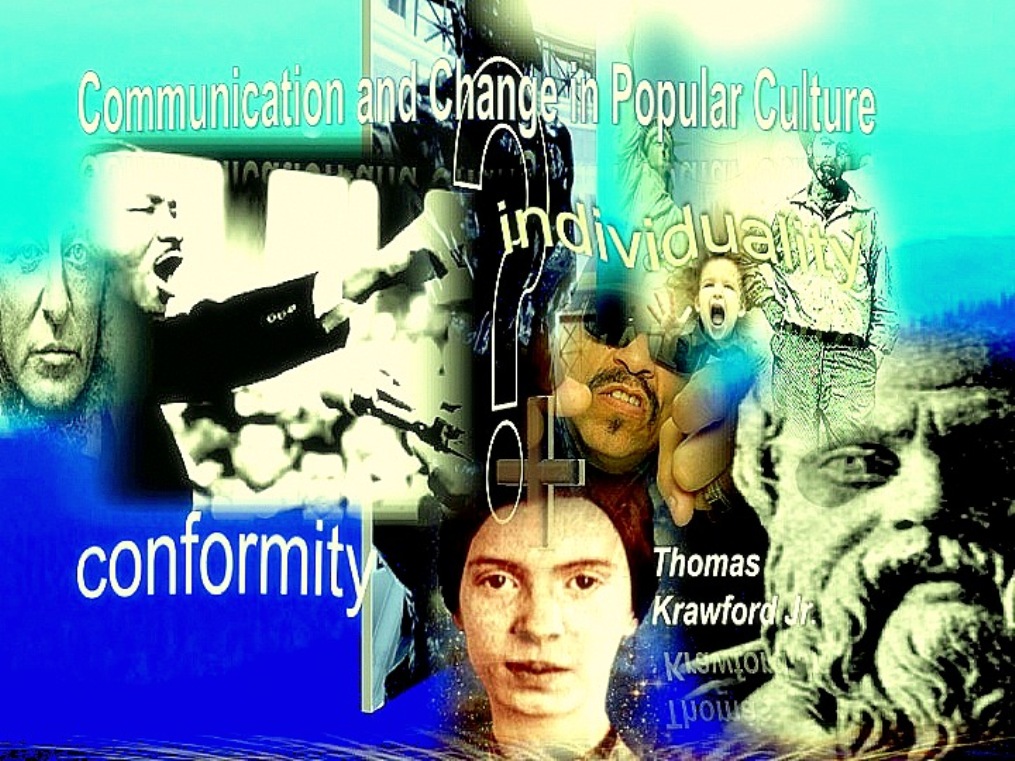Further Literary Application of H.T.I. Theory
"You Are My Only Son." Three Narrative Boundaries
in James Welch's The Heartsong of Charging Elk.
Thomas E Krawford Jr.
DR. L Burlingame Literature
361 Native American Novel
Thomas E Krawford Jr.
Dr. L Burlingame
Literature 361 Native American Novel
28 November 2007
"You Are My Only Son." Three Narrative Boundaries in James Welch's The Heartsong of Charging Elk.
Language defines and reaffirms our sense of reality as men and women in this society and culture. In James Welch's The Heartsong of Charging Elk, the inverse narrative of dislocation where the Native American world and the Judeo-Christian Western world collide, leaving in their wake fragments of identity are the shards from which Charging Elk, Welch's protagonist, must find a new language to redefine his existence. However, I will argue that Charging Elk's narrative of cross cultural mediation moves between communal and spiritual boundaries as well and from these locations James Welch illustrates how the bond between dreams and the physical reality of an intercultural language is not weakened because of the negative, but strengthened.
For example, on page 235 of the text, Charging Elk has a vision in which he sees the bodies of his people lying in a heap at the bottom of a cliff. He tries to join them but is pushed back by the wind and a voice that echoes like the thunder of buffaloes killed by opportunistic hunters. The voice speaks to him in his native tongue: "You are my only son" (Welch). In this vision, the spiritual element of the author's narrative centers the interconnectedness I spoke of in a previous paper in the sameness Mary Jane Lupton discussed in her 2001 interview with James Welch (Lupton).
In that interview, Ms. Lupton asked Welch about a Renaissance in Native American writing. He agreed, making note of N Scott Momaday's work as well as Joy Harjo and Sherman Alexie (Lupton 201-2). What I found most interesting about the interview was how an existential hero like Jim Loney for instance, although similar to Bigger Thomas in Native Son, could not actually describe the alienation of Charging Elk. The displacement itself is the key to what I argue is the interconnectedness of the spiritual boundaries of the cross-cultural world where Charging Elk ultimately chooses to survive. In fact, displacement as both an inversion of the Western vanishing American Indian myth and a relocation of Native American subjectivity as an interrogation of the exotic (Opitz; Donahue) places the bonds between spiritual and physical realities directly within the boundaries of cultural and racialized identity.
This occupied "new" space is an articulated joint interrelation where barriers of difference are simultaneously bridges of sameness. I assert that James Welch's protagonist, Charging Elk embodies what Andrea Opitz suggests is a reimagining of the racially violent language of the fetish (Opitz 99-102). Yet, to leave our discussion here would leave to chance a cultural identity Donahue suggests: that although worlds away from one's people, the universal conflicts Charging Elk faces in turn forge a third identity. One removed from the tribe in the material sense while connected to them in the dream sense: the sense that Charging Elk believes is the most real (Donahue; Lupton).
This repeated interconnectedness is characteristic of the novel, but one scene in particular stands out as an illustration of how the language of an intercultural connectedness similar to the connectedness of Charging Elk to his people is strengthened even in the context of negative circumstances.
In late August, the Prunes were ripe. in a small ritual that the Grazier
family had practiced for generations, Vincent, Lucienne and Nathalie
along with Charging Elk, walked out to the Orchards and stood under
a large old tree that had been a bellwether for at last five generations
of Graziers. They each picked a prune, smelled it, until the juice ran out
the stem end, then bit into it (Welch 376).
This is passage is significant on many levels. First what we do not see here is any hint of objectification or fetishization of Charging Elk. In fact, the circle suggests he is not just attending a family ceremony generations old; he is actually part of its proceedings. He is jointly related to something communal. Secondly, Lucienne, Vincent's wife and Nathalie's mother is very sick here. Later she dies, but in this scene, her sickness and Charging Elk's alienation create an interrelation of counter opposition.
In other words, as Lucienne is passing into history much like the harvest, Charging Elk is coming into history not from the perspective of assimilation but as part of his environment. In fact, not only does he not cross himself as the others do in this scene, he later marries Nathalie with Vincent's blessing. Within the two counter related narrative boundaries of joint communal and the direct spiritual, the language of intercultural relation is not only possible, in Welch's
novel and perhaps for Native America as well, it is inevitable. However, the concept of counter opposition as that constancy in the occurrence of opposing histories also describes the fetishization of cultural identity that displaces Charging Elk and Native America.
For example, the context Welch uses in the Wild West show represents how complicit cultural narratives see the Native American as a product removed from any kind of active citizenship in a nation where they were supposedly celebrated as First Citizens (Opitz).
Displacing the racialized, other as part of the nation's past…the Wild West
Show plays its part in the drama in which the modernist narrative of the nation
relies on cultural practices and productions to imagine the Indian as the country's
first citizen..whose perceived primitivism allows the nation's civilization to emerge
as a chronological development (Opitz 101).
In terms of counter opposition where that which is negative opposes yet supports that which is positive the language of an intercultural interconnectedness although almost existential and not quite assimilation is indeed a language of survival from the greatest common general circumstance to the least individual result of subject or object occurrence. As the racialized, other exists as a displacement of identity, it and those of us who live on that reservation don't need to be heroes like Jim Loney or Bigger Thomas (Lupton 205-8), we just need to survive.
Yet, in Charging Elk's case, part of his path takes him to a place where he meets what becomes for him, a Siyoko, or evil spirit. He kills the Siyoko because in the Welch's words:
J.W: What he's doing is ridding the world of an evil presence. It goes to culture
it goes to a tabooed act, plus I think it's something that even sophisticated
readers, contemporary readers would be shocked by. I felt really great
about that.
MJL: I had a feeling it was a little impish, that there was a little bit of the
Coyote there (Lupton 208).
Although Welch doesn't literally use a Trickster figure in the novel, when Charging Elk kills Breteuil, the trickster motif as catalyst firmly brings the spiritual reality which for Charging Elk is real together with the Judeo Christian western sensibility where reality is more material than spiritual. Here is yet, one more example of why Welch's protagonist is not engaged in assimilation. Charging Elk is actively self- rehistorizing: replacing his displaced cultural identity with the combined physicality and spirituality of his narrative: a construction of subjectivity that simtaneously interrogates essentialism and racism by its very existence (Lupton; Opitz; Donahue; Krawford Three Faces of Earth).
In a previous paper, I made note of Linda Hogan's description of Belle Graycloud as a Grandmother Mountain with a Raven Crown while she and an intercultural community of people stood together against Sheriff Gold and his men (Krawford 3-4). I mention that moment here because in James Welch's novel, we start at a time where the world is multicultural: the Native Americans, the soldiers at the fort, possibly profiteers hanging on, all would appear to an 11 year old Charging Elk in much the same as our world may appear to many of us at first glance. But then, Charging Elk wakes up, years later in a French hospital, not by choice and yet not by force either: a circumstance that could happen to any one of us and did in fact happen to Native and African America as late as yesterday (Krawford; Lupton).
Welch's protagonist is separated from is people. Thus begins his journey and ours as well as we see the world we live in through his eyes and feel what some parts of that world try to do to his heart. The three narrative boundaries within which Charging Elk's narrative moves and breathes are the three images we have of him creating a language that reclaims his displaced cultural identity as a de-objectified subject in relation and not in essence (Opitz 100). Along these lines then, we have the image of the summer plum tree around which Charging Elk's life counter opposes Lucienne's death. This is the joint communal relation of how his language comes to shape his interpretation of his experience. There is the innocence and practicality of his spiritual self-counter opposed by Breteuil's material fetishization of Charging Elk as an individual that also shapes Charging Elk's perception of his intercultural reality. Yet this image is an inversion of the image Charging Elk sees in his vision where the bodies of his people lay dead at the foot of a cliff and he cannot join them: a voice speaks to him in his native tongue and tells him "You are my only son."
These interrelated boundaries constantly occur throughout Welch's novel, but they do not cancel out each other: they give each other the reason to exist. And they Ultimately give Charging Elk the ability to choose survival, sure: but also community. Thus, as the story ends and he walks back home to his wife Nathalie, whom herself is sick but perhaps for a different reason, Charging Elk goes to a world Welch didn't create as much as he described a place we all have to live in and we have to do it together, whether we like it or not.
Donahue, James J. ""A World Away from his People"." Studies in American Indian Literatures 18.2 (2006).
Krawford, Thomas. "Three Faces of Earth: Representations of Communal Diversity in Linda Hogan's Mean Spirit." Unpublished. Dr. L Burlingame. Modern American Literature Eastern Michigan University.Spring (2007).
Lupton, Mary Jane. "Interview with James Welch [1940-2003].: November 17, 2001." The American Indian Quarterly. 29.1&2 (2005).
Opitz, Andrea. ""The Primitive Has Escaped Control": Narrating The Nation in The Heartsong of Charfging Elk." Studies in American Indian Literatures 18.3 (2006).
Welch, James. The Heartsong of Charging Elk. First Anchor Books. Random House. New York N.Y.: Anchor Books, 2001. 235.


+of+IMG_9264.jpg)



